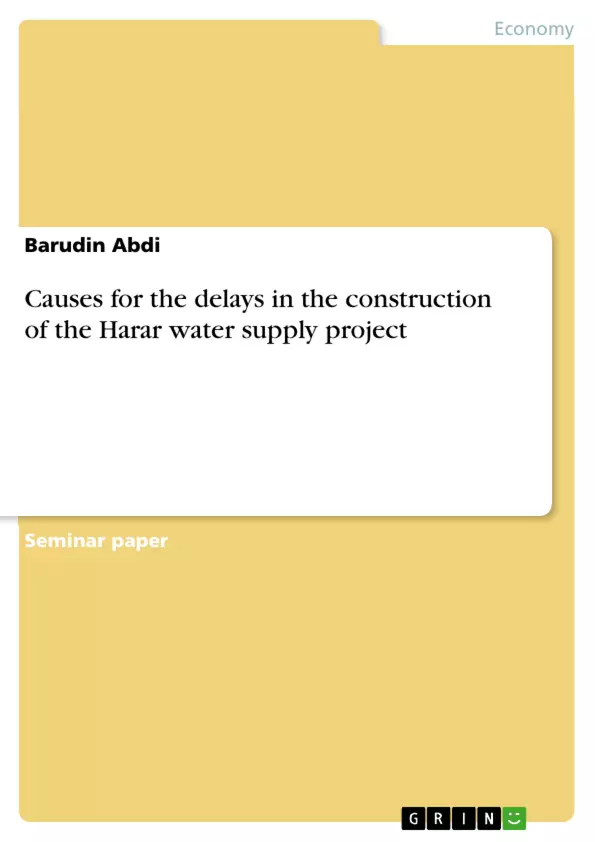The Harar Water Supply and Sanitation Project took more than 36 months to be completed and thus did not adhere to the original closing date but faced an enormous delay and caused high cost overruns. Due to the failure in completing the project within the agreed time target, there were severe problems in the socioeconomic development of the areas affected. In the view of the above, there is a need for a better understanding of the causes and effects of the delays in the construction of the Harar Water Supply and Sanitation Project.
This study assesses the causes for the delay of the project. To achieve this, a detailed literature review will help to examine previous studies in the research area and identify the major causes and effects of delays in similar project in other countries. I will also review the full report of the Harar water supply construction project. An interview survey will furthermore help to identify the factors that contributed to the delay.
Inhaltsverzeichnis (Table of Contents)
- Introduction
- LITERATURE
- Previous studies
- Delays construction project
- Causes of Delay construction project
- Overview of Harar Water Supply construction project
- Location of the Project and Duration
- Location of the Project
- Duration of the Project
- Budget of the project
- Objective of the project
- The major component of the project
- Purpose of the project
- Project activity
- Assessment of the project achievement
- FINDING
- The causes of delay construction Project
- Implementation challenges
- Project design complexity
- The effect of delay in construction project
- Action taken to solve the problem of delayin project
- CONCLUSIONSAND RECOMMENDATIONS
- Conclusions
- Recommendations
Zielsetzung und Themenschwerpunkte (Objectives and Key Themes)
This study aims to assess and identify the causes for the delay of the Harar water supply construction project. The research examines the factors contributing to delays in construction, investigates the impact of these delays on the project, and explores potential solutions to overcome these challenges.
- Causes of delay in the construction of water supply projects
- Impact of delays on water supply construction projects
- Solutions to address delays in construction projects
- Implementation challenges encountered during the project
- Project design complexity and its role in delays
Zusammenfassung der Kapitel (Chapter Summaries)
The study begins by introducing the concept of delay in construction projects and its significance. It then delves into a literature review, exploring previous studies and common causes of delays in construction projects. The research focuses specifically on the Harar water supply construction project, analyzing its location, duration, budget, and objectives. The study investigates the major components of the project and its purpose, examining the project's activities and assessing its achievements.
The study then analyzes the findings, highlighting the major causes of delay identified in the Harar project. These causes include implementation challenges, project design complexity, and the impact of delays on the project's overall timeline and budget. The research concludes by presenting recommendations to address the challenges and mitigate future delays in similar construction projects.
Schlüsselwörter (Keywords)
The study focuses on the causes of delays in construction projects, specifically the Harar water supply project. Key concepts include implementation challenges, project design complexity, procurement processes, and the impact of delays on project outcomes. The study explores solutions to address these challenges and improve the efficiency of future construction projects.
Frequently Asked Questions
What caused the delays in the Harar Water Supply Project?
Major causes identified include implementation challenges, project design complexity, and issues within the procurement processes.
How long was the project delayed?
The Harar Water Supply and Sanitation Project took more than 36 months longer than originally scheduled to be completed.
What were the socioeconomic effects of these delays?
The failure to complete the project on time caused severe problems in the development of the affected areas and led to high cost overruns.
What research methods were used to identify the causes of delay?
The study utilized a literature review of similar projects, a review of the project's full report, and interview surveys with stakeholders.
What are the recommendations for future water supply projects?
The study suggests better planning, addressing design complexities early, and improving implementation strategies to mitigate future delays.
- Arbeit zitieren
- Barudin Abdi (Autor:in), 2019, Causes for the delays in the construction of the Harar water supply project, München, GRIN Verlag, https://www.grin.com/document/456666



